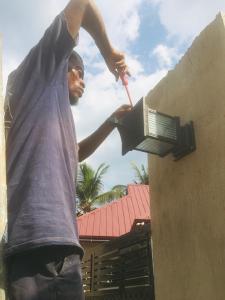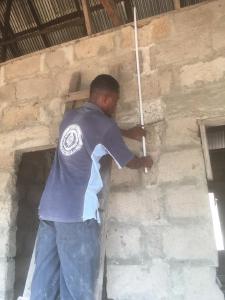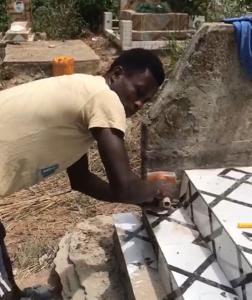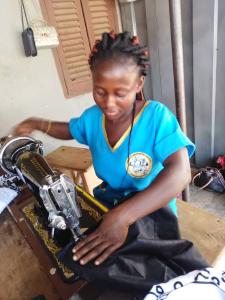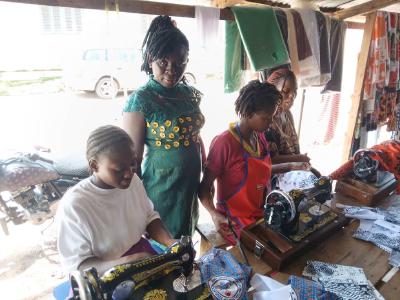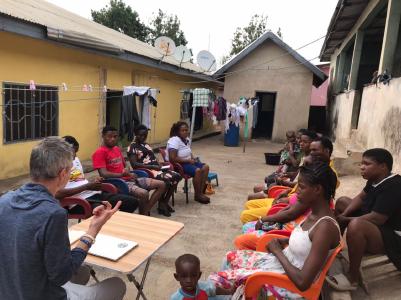Expansion of apprenticeship scheme
Click on any photo to expand it.
Rationale and planning
During the course of our work, Turbo Ghana has constantly found the need to help young people develop their careers and improve their prospects. We started our apprenticeship scheme last year with four apprentices. Later in the year, we added a further five, bringing the total to nine.
Current apprentices
Our current apprentices are as follows:
| Apprentice | Trainer | Skill | Start date | Expected duration |
|---|---|---|---|---|
| BG | KK | Tailor | 1 April 2024 | 36 months |
| FO | KK | Tailor | 1 April 2024 | 36 months |
| RA | KK | Tailor | 1 November 2024 | 36 months |
| JO | MO | Tailor | 1 December 2024 | 32 months |
| LY | MO | Tailor | 1 November 2024 | 12 months |
| EO | P | Electrician | 1 November 2024 | 27 months |
| AO | P | Electrician | 1 November 2024 | 36 months |
| AA | B | Tiler | 1 November 2024 | 24 months |
| ROK | B | Mason | 1 April 2025 | 12 months |
These pics (of AO, EO, AA, JO, and other tailors at work) were all taken between February and May 2025.
How the apprenticeship scheme works
We pay the apprentice a monthly stipend (currently 600 GHC/month, about £40), and we pay the trainer a one-off fee (negotiated individually). We also pay for the apprentice’s tools, and (at the end of the apprenticeship) for their graduation. Apprenticeships are quite formalised in Ghana, and each of the trades has an association which conducts examinations and confers graduation. Last year, we attended the Ghana National Tailors and Dressmakers Association graduation.
We held a meeting of our apprentices during Mark’s visit in February 2025. The main outcome was expressions of appreciation for the scheme.
For apprentices that live too far to commute daily, we have three rooms in Nsuta which they can live in during the week. Currently, there are four apprentices living there.
So far, our recruitment procedures have been rather informal. We interviewed apprenticeship candidates and trainers, and asked them to meet up with each other. If the fit is good, we have put them on a trial period for a week or two. If the fit is still good, we have appointed them as apprentices.
The trainers are tradespeople that have been working in Nsuta for some years, and are generally known to us. KK and MO each have a shop in Nsuta, where they make and sell clothes. P, B, and B have practiced as electrician, tiler and builder (called “mason” in Ghana) in and around Nsuta. B’s team has worked on several Turgo Ghana projects.
How we will expand the scheme
The Turbo Ghana apprenticeship scheme has become very popular; during 2025 we have received a lot of requests to join it. We will have a more formalised application process, which aims to open in about September 2025, so that we can conduct interviews of shortlisted candidates when we visit in November. We aim to add 5-8 new apprentices this year (the exact number will be determined during the interviewing process). Vivian Danso has helped us with our apprenticeship scheme since the start and last year we appointed her as the official apprenticeship monitor and coordinator.
We will adopt the following principles:
-
The recruitment process will be open and transparent.
-
It aims to have at least as many women as men.
-
It should select individuals that are most likely to be succesful apprentices. Positive factors will include prior experience in the apprenticeship activity, and good schooling results.
-
It should be concentrated both geographically and in terms of the learned trade in areas where we can easily manage the apprentices.
The deadline for completed applications will be 30 September. We will shortlist during October, and interview shortlisted candidates in November. The interview panel will consist of Mark Ryan, Kwasi Alare, and Vivian Danso.
Costs
A three year apprenticeship costs about £1500 in stipend (over three years) and a further £500 in other costs. As we will appoint up to 8 apprentices in November, we are aiming to raise about £16,000 for this expansion.
